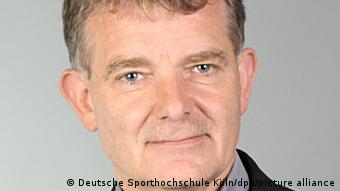The most recent findings on the subject of testicular cancer in the Bundesliga have drawn attention and also been frightening. The disease was recently diagnosed in four players. While Timo Baumgartl (Union Berlin) and Marco Richter (Hertha BSC) are fit and healthy again after successful treatment, Sebastien Haller (Borussia Dortmund) and Jean-Paul Boetius (Hertha BSC) are on the right track to making a full recovery . Is this perceived increase in testicular cancer cases a coincidence or are the diagnoses related to competitive soccer?
“This seems to be an accumulation, it could be coincidental,” Wilhelm Bloch told DW. The sports physician at the German Sports University in Cologne has been researching cancer and sports for many years. “Most scientific studies come out that there is no accumulation overall.” Testicular cancer is a disease that mostly affects men at a young age, explains the scientist.
Studies mainly on cycling
Around 4000 testicular cancer diagnoses are made in Germany every year. This is the most common tumor disease in young adults between the ages of 20 and 40. “At the moment, however, there is no scientific evidence that young athletes are more likely to develop illnesses,” says Bloch. Other factors have been identified. For example, young men who are over 1.80 meters tall are more likely to be affected by testicular cancer, “which could be related to growth and the muscular system,” says the sports doctor. In addition, hormones – externally supplied or your own – are likely to play a further role in this disease. According to Bloch, however, a specific cause of testicular cancer has not yet been discovered.
Especially in cycling, a possible connection between the tumor disease and sport has been investigated. “Because you sit on your saddle. This means there is actually constant pressure on the testicles, which can lead to micro-injuries. But we haven’t noticed any accumulation in cycling either,” says Bloch.
No way of prevention
According to the scientist, other possible influencing factors could come into focus: “Body temperature, for example. In athletes, the temperature is often brought into a range that most other people do not reach.” In addition, intensive sport changes the hormonal balance. Genetic factors could also play a role in young people developing testicular cancer.
According to current scientific knowledge, there is no prevention against the disease, says Bloch. But the sports doctor also has good news for everyone who suffers from testicular cancer: “Testicular tumors are what are known as germ cell tumors. They are easy to treat, especially if they are diagnosed early. In many cases, the affected athletes can return to their sport quite quickly to return.”
No urological examination planned
Even if, from a scientific point of view and based on the current state of knowledge, there is no direct connection between testicular cancer and sport, the cases in the Bundesliga have worried the professionals. “The players are already worried, sensitive to this issue and are now having themselves examined,” Karl-Heinrich Dittmar, team doctor for Bayer 04 Leverkusen’s Bundesliga team, told DW. “It’s a not-so-rare tumor in young men.”
Players would undergo regular medical check-ups. “But you have to make a precise distinction: in a suitability test, that of the German Football League when signing up [von Profis] is mandatory, a urological examination of the players is not part of it,” explains the sports doctor. What exactly the clubs include in their examination package is up to the clubs themselves.
Many blood parameters are checked
“We at Bayer 04 Leverkusen usually do an MRI [Schichtaufnahmen der Körpers – Anm. d. Red.], where the pelvis and thighs are imaged. The testicles can also be seen on it. You can see something there. In addition, there are so-called tumor markers in the blood, which we help determine in every blood test,” says Dittmar. “What we do as a screening is sufficient because the blood parameters that we determine are very sensitive.”
Since 2002, when Dittmar started working at Bayer 04, there has not been a case of testicular cancer at the club. The current number of cases is also too low for the Bundesliga club’s sports doctor to construct a connection with football. “It’s more of a coincidence,” says Dittmar. “But that doesn’t mean we won’t continue to be very vigilant.”















